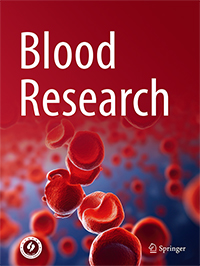Korean J Hematol 1993; 28(1):
Published online March 31, 1993
© The Korean Society of Hematology
13-cis-retinoic acid (isotretinoin)와 granulocute colony stimulating factor로 완전관해가 유도된 괴사성 봉소직염을 동반한 급성 전골수구성 백혈병 1례
이철환, 김상욱, 서철원, 이규형, 이정신, 김상위, 지현숙, 김상희
서울 중앙병원 내과,
서울 중앙병원 임상병리과
Isotretinoin and Granulocyte Colony Stimulating Factor Induced Complete Remission in a Patient with Acute Promyelocytic Leukemia Complicated by Life Threatening Wound Infection
Acute promyelocytic leukemia (APL) is a unique entity in the spectrum of acute myelogenous leukemia. It has several characteristic features including a distinctive
morphology, a characteristic chromosomal translocation t(15, 17), and associated disseminated intravascular coagulation. Retinoic acid is a safe and highly effective agent for inducing complete remission (CR) in patients with APL. Granulocyte colony stimulating factor (G-CSF) significantly enhances retinoic acid induced granulocytic
differentiation of APL cells in vitro. We report a case of a 58-year-old woman with APL who presented with peri-rectal abscess and underwent colostomy. The clinical course was complicated by a extensive necrotizing which developed over the colostomy site. The patient treated with isotretinoin and G-CSF as well as combination of antibiotics. The patient successfully achieved CR with resolution of wound infection.
A combination of isotretinoin and G-CSF may replace conventional combination chemotherapy such as ara-C and daunorubicin as a remission inducing regimen in
patients with APL and life threatening infection.
Keywords Isotretinoin; G-CSF; Acute promyelocyic leukemia;
Article
Korean J Hematol 1993; 28(1): 143-149
Published online March 31, 1993
Copyright © The Korean Society of Hematology.
13-cis-retinoic acid (isotretinoin)와 granulocute colony stimulating factor로 완전관해가 유도된 괴사성 봉소직염을 동반한 급성 전골수구성 백혈병 1례
이철환, 김상욱, 서철원, 이규형, 이정신, 김상위, 지현숙, 김상희
서울 중앙병원 내과,
서울 중앙병원 임상병리과
Isotretinoin and Granulocyte Colony Stimulating Factor Induced Complete Remission in a Patient with Acute Promyelocytic Leukemia Complicated by Life Threatening Wound Infection
Cheol Whan Lee, Sang Wook Kim, Cheol Won Suh, Kyoo Hyung Lee, Jung Shin Lee, Sang We Kim, Hyun Sook Chi, Sang Hee B Kim
Department of Internal Medicine, Clinical Pathology, Asan Medical Center, University of Ulsan, Seoul, Korea
Abstract
Acute promyelocytic leukemia (APL) is a unique entity in the spectrum of acute myelogenous leukemia. It has several characteristic features including a distinctive
morphology, a characteristic chromosomal translocation t(15, 17), and associated disseminated intravascular coagulation. Retinoic acid is a safe and highly effective agent for inducing complete remission (CR) in patients with APL. Granulocyte colony stimulating factor (G-CSF) significantly enhances retinoic acid induced granulocytic
differentiation of APL cells in vitro. We report a case of a 58-year-old woman with APL who presented with peri-rectal abscess and underwent colostomy. The clinical course was complicated by a extensive necrotizing which developed over the colostomy site. The patient treated with isotretinoin and G-CSF as well as combination of antibiotics. The patient successfully achieved CR with resolution of wound infection.
A combination of isotretinoin and G-CSF may replace conventional combination chemotherapy such as ara-C and daunorubicin as a remission inducing regimen in
patients with APL and life threatening infection.
Keywords: Isotretinoin, G-CSF, Acute promyelocyic leukemia,





 PDF
PDF Standard view
Standard view Export citation
Export citation Share
Share  Previous Article
Previous Article



